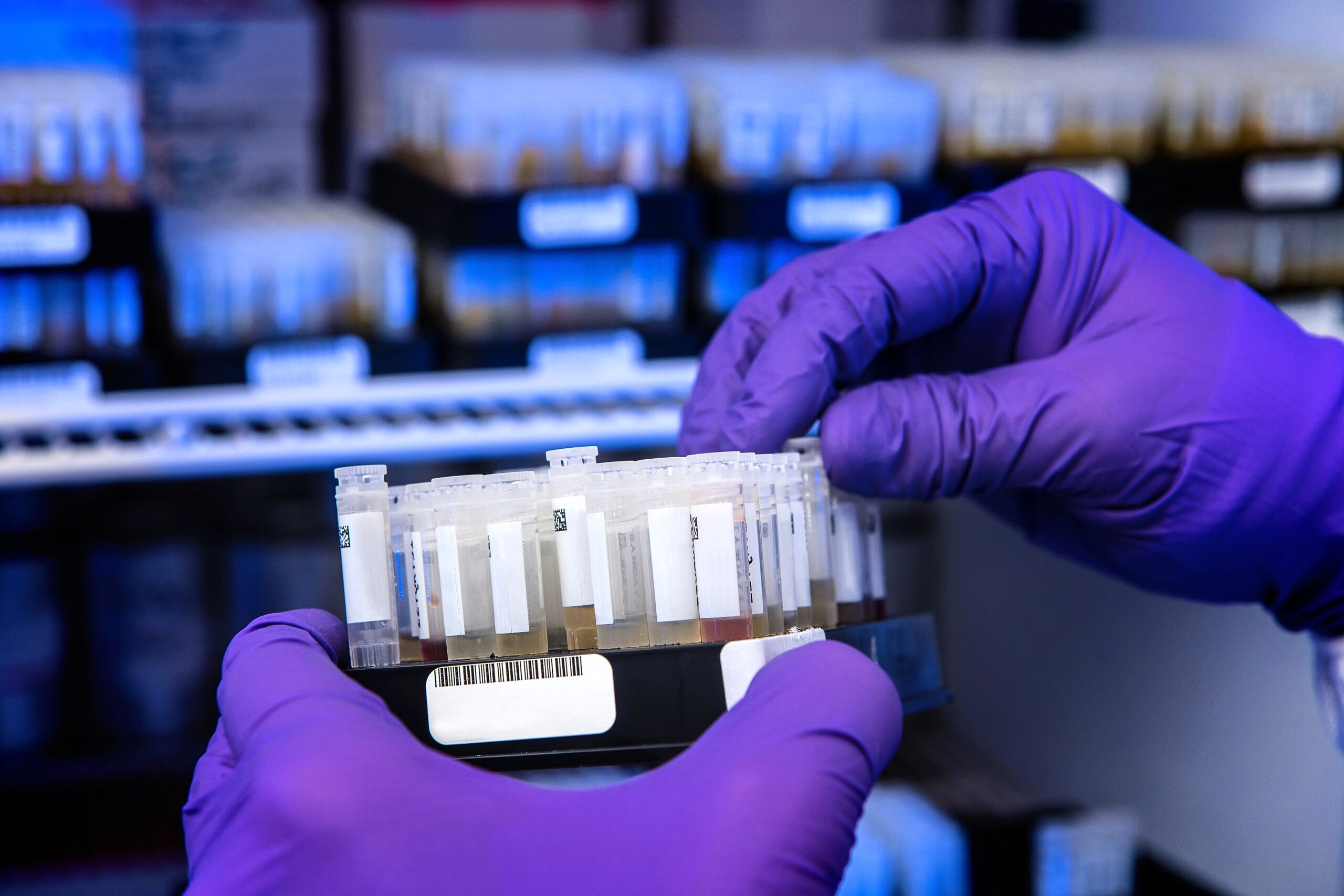With food intolerances on the rise, we answer the question, how accurate are food sensitivity tests? We review the evidence and share a Dietitian’s perspective on these expensive tests.

We all know that what we eat can have a big impact on our health, and so can the foods we avoid eating (anyone with celiac disease or a peanut allergy can attest to that!). Eating foods we’re allergic to can have life-threatening consequences, but lately, we seem to be hearing more and more about food sensitivities. Could certain foods we eat trigger a delayed immune response, leading to fatigue, migraines, intestinal discomfort, eczema or asthma? How might we even know which foods throw our immune systems into red alert?
Food sensitivity testing, which measures the IgG antibodies the immune system creates in response to proteins found in certain foods, seems like an attractive option. Take a blood test, wait a couple weeks, and then receive a list of the foods you’re sensitive to – foods you can avoid! It all seems efficient and easy, right? Not so fast! How accurate are food sensitivity tests? The science behind these tests is by no means conclusive, and may very well be completely wrong. So let’s take a closer look!
What is a Food Sensitivity?

A food sensitivity can also be referred to as an intolerance, and really, it’s any unpleasant reaction you might have after eating a certain food. A glass of milk might leave you bloated, nauseous, cramping, headachy, or just generally unwell. But wait! How’s that different from a food allergy? Well, food allergies are severe reactions that arise after consuming only a tiny amount of a certain food (nuts, corn, shellfish, etc), and they are the result of an intense immune response. Basically, your immune system sees even the tiniest protein in, say, a peanut as a threat, and starts to fight it off, releasing a storm of histamine. The result can be a swollen tongue, constriction of the esophagus and airways, dizziness, fainting, hives, nausea, or a sudden drop in blood pressure, all within minutes of eating that innocent peanut. By contrast, food sensitivity reactions can take hours or even days to develop, and if you’ve only had a small portion of the offending food, you may not have any symptoms at all.
Allergy Testing

Skin Prick Test
And how do you know whether or not you’re allergic or just sensitive to a food? The most commonly done test for a bona fide allergy is the skin-prick test. This is usually done at an allergist’s office, and involves making a teeny puncture in the skin (usually on the forearm), and then applying a drop of a specific allergen on the puncture. After around 15 mins, if you’re allergic to that substance, that puncture will have turned into an itchy, red bump. An allergist can test anywhere up to 40 different possible allergens at one time, depending on how many little punctures you’re willing to have.
Food Sensitivity Testing

Elimination Diet
Testing for food sensitivity is a little different. The simplest, and cheapest, way to test for a sensitivity is through a trial elimination. This involves cutting out a whole bunch of “possible offenders”, like gluten, corn, soy or dairy for several weeks, and then slowly reintroducing them, one at a time, and looking for any symptoms. The downside? It’s time-consuming and requires severe restriction of your diet for a couple of months.
Testing IgG Antibodies
But swooping in to save the day is IgG food sensitivity testing! However, how accurate are food sensitivity tests? Immunoglobulin G, or IgG, is a compound that’s produced by your immune system whenever it’s exposed to a foreign substance. This could be a food, a bug, or a vaccine. Our immune systems produce five different classes of immunoglobulins (IgA, IgM, IgD, IgE and IgG), but IgG is far and away the most common. So the million-dollar question is: does a high level of IgG antibodies toward a certain food mean you’re sensitive to that food? At the moment, the answer seems to be a big ole’ question mark.
For example, a recent study found no connection between IgG antibody levels and people’s perceived intolerance to milk or wheat. What allergists and immunologists do seem to agree on is that IgG antibodies are a measure of exposure to a certain food, and may in fact be a marker of tolerance, rather than intolerance! However, this hasn’t stopped labs from offering IgG tests to determine food sensitivity, and it hasn’t stopped healthcare practitioners from suggesting or ordering them for confused clients.
Who’s Ordering IgG Food Sensitivity Tests?
In Canada, lab work can be requested by doctors, dentists and naturopaths, but it seems to be largely naturopaths recommending IgG testing to clients. But in the US, certain states allow people to order their own blood work, and that’s where things get especially sketchy: these tests are a business, after all, and can easily fool people with a couple of cherry-picked scientific studies, or fancy, pseudo-scientific terms like “bioresonance”.
IgG Food Sensitivity Testing in Canada

Let’s break this all down a bit to answer the question, “How accurate are food sensitivity tests?”. In Canada, two main labs offer IgG food sensitivity testing. First, there’s Gamma Dynacare, which offers a food intolerance test on over 200 foods, stating that:
“food-specific IgG antibodies (produced by the body’s immune system) and symptoms of food intolerance are closely linked”
and therefore, their test can pinpoint the foods that cause you sensitivities. Their website provides no research to back up this claim, and goes even further, stating that:
“these foods can bring on a wide range of unpleasant symptoms such as respiratory or gastrointestinal disorders, migraines, headaches or dermatological problems such as eczema.”
What’s most concerning about Gamma Dynacare is that they provide a huge range of legitimate, standard medical tests, used by doctors every day. So, even a doctor, using Gamma Dynacare’s labs for normal medical testing in daily practice, might be fooled into thinking these IgG tests are valid.
The other lab in Canada offering IgG testing is Rocky Mountain Analytical, which has a more slick sales pitch, including links to several research studies backing up the connection between IgG antibodies, food sensitivity and migraines, IBS and obesity. These studies tend to select participants with a common health issue (i.e. IBS), test them for IgG antibodies toward certain foods, and then put them on either a diet that eliminates the offending foods, or a sham diet that eliminates random foods, as a placebo.

The studies listed by Rocky Mountain Analysis show modest reductions in symptoms of migraines or IBS, but they don’t constitute proof that IgG antibodies to certain foods are at the root of these health issues. In fact, a systematic literature review that examined a number of studies connecting IgG testing to IBS found that on the whole, there wasn’t enough evidence to support any connection between the two. The authors also brought up the point that there is a huge variation of results between different labs offering IgG testing, so the test really isn’t yet precise enough to use for any clinical purpose.
And when it comes to IBS, there’s yet another twist. Researchers have reason to believe IBS symptoms are made worse by fermentable sugars known as FODMAPs. These sugars, found in grains, dairy and certain fruits and vegetables, aren’t digested, but instead pass into the colon, where they are fermented by intestinal bacteria, causing bloating, pain, diarrhea and general yuck. Our immune system produces antibodies in response to proteins, not sugars, meaning that IBS and other similar digestive issues may have nothing to do with IgG antibodies at all.
Testing Food Sensitivities Through Hair

Is your head spinning? Well, it gets more complex, because it turns out IgG testing isn’t the only method of testing for food sensitivities being marketed out there. Another company, Test Your Intolerence, offers food sensitivity testing by examining: your hair! The tests run anywhere from $85 for a basic package (testing 300 items) to $106 for the advanced package (testing a whopping 725 items!), and claim to identify food sensitivities, nutrient deficiencies and metal toxicities, all from a couple strands of hair. The website doesn’t describe exactly how this is done, or what compounds are being identified as markers of intolerance, but it does provide a number of “case studies”, which are just jubilant testimonials from customers who have kicked their migraines or banished their rosacea (inflammatory skin condition). However, hair analysis has never been shown to be a valid diagnostic tool for food intolerance or nutritional deficiencies (although it is useful for identifying metal toxicities). So unless you’re a geriatric billionaire whose gold-digging spouse is trying to slowly poison you with arsenic, hair analysis isn’t going to yield any meaningful answers. In fact, hair grows so slowly, there’s no reason whatsoever to think that the foods you eat from one day to the next would show up in your luscious locks.
Testing Food Sensitivities Through Electricity
Another form of sensitivity testing is the Vega test, or electrodermal testing, which operates on the principle of “bioresonance”. The test involves measuring changes in your electrical impedance: the amount your body conducts or resists electricity. Electrical impedance can be used effectively to determine percentage of body fat, but there’s absolutely no scientific reasoning as to how it relates to food allergies or sensitivities. In fact, proponents of Vega Testing seem unbothered by the lack of a reasonable explanation for how the test actually works. Very few studies have been conducted on this likely bogus test, but one study found no correlation between the results of Vega testing for food allergies and those obtained from the well-validated skin prick test.
Bottom Line – How Accurate Are Food Sensitivity Tests?
So what’s the harm in giving these food sensitivity tests a try and how accurate are food sensitivity tests really? First off, they don’t come cheap: for example, IgG tests run between $100 and $500, and they aren’t covered by insurance. Secondly, none of these tests have reliably shown any efficacy, so they’re likely a waste of money. Finally, restricting foods is never a great idea, unless we’re talking about foods you’re legitimately allergic or sensitive to. Grains are rich in B vitamins, magnesium and fibre; dairy is a great source of calcium, potassium and Vitamin D; eggs are high in B12; and soy proteins can lower LDL cholesterol, you get the picture. Cutting these foods out over the slight possibility they might cause a sensitivity means cutting out the variety of nutrients they provide. And in the end, being constantly afraid of eating certain foods is anything but healthy.

I’m not saying that cutting out milk won’t cure your stomach cramps, or that kidney beans aren’t the cause of your migraines – but I am saying that IgG food sensitivity testing isn’t likely to provide you with any valid answers, and neither will the other food sensitivity tests out there. At the moment, our understanding of food sensitivity is in its infancy, and any “magic bullet” tests are probably a waste of time and money. If you truly feel that something you’re eating is making you feel crummy, the most scientifically reasonable test would be to work with a dietitian to cut out all possible offenders for a couple of weeks, then slowly reintroduce them into your diet, one by one, while taking notice of any changes in your well-being. At the end of the day, when it comes to food sensitivities, there isn’t yet a test to take the place of trial and error.
Contribution By: Adam Weinmann
MORE BLOG POSTS YOU MIGHT LIKE
If you liked this blog post answering the question, “how accurate are food sensitivity tests?”, then you might enjoy more blog posts discussing diet myths:
- 411 on Intermittent Fasting for Athletes and Exercise: Will It Help or Hinder Your Performance?
- Intermittent Fasting for Weight Loss? The Evidence Based Pros and Cons
- Caffeine and Breastfeeding – Is It Safe?
- Can You Drink Coffee While Intermittent Fasting?
- Teen Weight Loss – Are Diets Safe for Growing Kids?
- Is Lemon Water Good For You?
Updated on May 9th, 2022

Abbey Sharp is a Registered Dietitian (RD), regulated by the Ontario College of Dietitians. She is a mom, YouTuber, Blogger, award winning cookbook author, media coach specializing in food and nutrition influencers, and a frequent contributor to national publications like Healthline and on national broadcast TV shows.





Julie McClure says
Great article! I’m becoming increasingly interested in IgG food testing and the role it plays reducing inflammation.
Beverleigh Fateev says
Hi Abbey,
I found you through YouTube and love your authenticity and perspective on healthy eating. Last year I saw a registered dietitian to get a better understanding of what a healthy diet for me would consist of. As a vegetarian with IBS, I was diagnosed with it when I was a teenager some 15+ years ago, I have had a difficult time understanding what foods to eat and what not to eat. My dietitian had me do a FODMap elimination diet to understand which foods triggered sensitivities for me. It was tough but it worked. Now I try to stay away from foods that are high in risk such as garlic (I miss it so!), onion, cauliflower, watermelon etc. I also downloaded the FODMap Monash App to help me.
The problem I have now that I’m back on a ‘normal’ diet is I am bored with the recipes I’ve been using. I was wondering if you knew of any good cookbooks, bloggers, or websites I could use to find vegetarian-friendly IBS recipes?
Thanks!
Abbey Sharp says
check out Stephanie Clairmont!
Natalie says
Great article. Very informative. I always wanted to do a food sensitivity test. I already tried elimination diet and it got me better. But maybe I could spend some money on doing the proper test. Some food still causing me pain and digestive problems. I need to solve that.
Abbey Sharp says
I hope they help. Thanks Natalie
Angela Cardamone @marathonsandmotivation.com says
This was such an informative post! I feel so fortunate that no one in our family has any food sensitivities!
Abbey Sharp says
For sure. Thanks love
Deborah Brooks says
Thanks for all the great info. Elimination testing sounds like the most logical and easiest place to start
Winkworth Eric says
It a great article just one small issue what about the real people suffering from (IBS) this blanket chronic problem that can cause digestive pain, upset, bloating, gas – fatigue, depression and sometimes
lead to more serious mental health problems.
Just keep scratching them and see what makes a rash? No rash no problems well except what your here for but it’s just pain – not like theirs an epidemic of pain medicine abuse across our country, if there were maybe our terrible track record of diagnosing and curing illness and disease would be noticed and in main stream news.
Fact maintenance of disease being you a customer for life – curing a disease brings you a customer for a week which sounds like a model to make money?
My partners life was on the brink of collapse from an IBS diagnosis and one of these un scientific Ige tests helped her to get everything back in order – mostly herself confidence and energy.
I am not saying taking the test looking at the results and shrugging your shoulders is going to do anything other then make your wallet lighter. In her case she was found to be sensitive to wheat, dairy, eggs end bananas.
Once she eliminated these from her diet it was less then a week and she was better; after over a year of agony. All the time yelling end this, Telling me to shoot her, she was in so much pain.”, ( to this day i believe whole heartedly she was in life altering digestive pain, and asking for a gun wasn’t something she ever did before or since)
Before this amazing save which gave her the information she needed to treat and cure her own disease. The MD’s PRACTICEd on her a great deal she had been scoped and probed a handful of times- her digestive tracked has more
video footage made of it then i have of my entire life to date.
All to say we found a little redness in and around ur stomach lining and bowel but nothing to be concerned about really everything looks “normal” so we will say it’s
Irritable bowel syndrome, just fyi that’s basically a round about way of saying, we have no clue bye bye now, would u like a hard peppermint candy and ohh don’t let the door hit u in the ass on the way OUT.
Thanks Doc for your scientific study and practicing on videotaping my innards i am gonna go see the woman you say is a quack now – see what she says – strange u never asked about my diet when this was about digestive upset? I could’ve been eating live bee’s
Abbey Sharp says
Thanks for sharing!